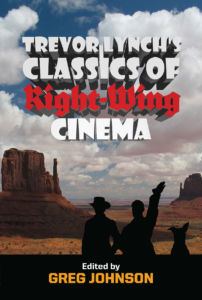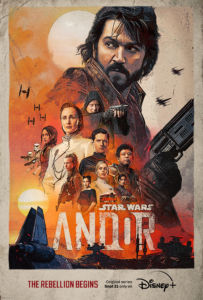Andor
All new Star Wars stories, like the denizens of a vast coral reef, need to inhabit nooks and crannies in the universe and narrative created by George Lucas. But there are better and worse ways to do this.
Disney has produced two kinds of Star Wars products: new and original stories and cynical, safe, nostalgic remakes. Four out of five of Disney’s Star Wars movies fell into the safe and cynical camp. (See my reviews of The Force Awakens, The Last Jedi, The Rise of Skywalker, and Solo.) But Rogue One directed by Gareth Edwards was a surprise pleasure: a genuine war film with a darker, more adult tone and an engaging visual style.
At that point, Disney really should have broomed out Jar Jar Abrams and handed Gareth Edwards the keys to the Star Wars “franchise.” But when Solo flopped due to a Gamergate-style fan boycott, the Mouse decided to cancel a host of movie projects and instead concentrate on series to be streamed on Disney+ .
The first of these series, The Mandalorian, started out with promise but quickly ran out of ideas and self-confidence. I can’t even remember if I watched to the end of the second season. Thus, although I think it is important to follow at least one pop-culture franchise as a way of monitoring mainstream media propaganda, I gave the other Disney+ Star Wars series a pass.
But then my friend Morgoth recommended Andor, a prequel series focusing on Cassian Andor, the rebel intelligence officer in Rogue One.
Andor is the creation of Tony Gilroy, the co-author of the screenplay of Rogue One, and thus remains entirely faithful to the characters and feel of the film. Andor is a genuinely excellent series. In fact, I regard it as one of the best science fiction series ever, up there with Firefly and the reboot of Battlestar Galactica.
Andor follows the intertwined stories of six principal characters.
Cassian Andor (Diego Luna) is a small-time criminal and outsider. He apparently grew up with other orphaned or abandoned children on a planet devastated by a mining disaster. He was then rescued and adopted by junk scavengers from off-world. He has difficulty trusting others and being honest with them, even his adoptive mother and closest friends.
Syril Karn (Kyle Soller) is an overzealous corporate security officer on a remote planet. He’s the kind of petty power-worshipper and indignation addict who would bark at you for not wearing your mask on the tram. He’d have a Pfizer tattoo and wish death upon the unvaccinated.
Luthen Rael (Stellan Skarsgård) is a ruthless and Machiavellian rebel organizer operating under the cover of a fey, glad-handling antiques dealer. This is one of Skarsgård’s best roles. He beautifully depicts the loneliness that comes with sacrificing everything personal to a political cause.
Senator Mon Mothma (Genevieve O’Reilly) is a mainstream political opponent of Emperor Palpatine who is secretly helping the rebellion and growing increasingly desperate as Imperial surveillance and control tighten around her. O’Reilly is a poised and subtle actress who is finally given space to breathe life into her role. I also enjoy the characterization of Mon Mothma’s world, Chandrila, a hierarchical and traditionalist civilization with a somewhat Japanese aesthetic but populated by good-looking white people.
Maarva Andor (Fiona Shaw) is Cassian’s adoptive mother. Her relationship with Cassian is poignant, because both are involved in the rebellion, but neither knows it — largely because of Cassian’s difficulty with being open even with his own mother.

You can buy Trevor Lynch’s Classics of Right-Wing Cinema here.
Dedra Meero (Denise Gough) is an ambitious supervisor in the Imperial Security Bureau who is hunting Luthen and believes that Cassian is connected to her quarry. She’s a discomfiting mirror for liberals and feminists, since they will root for her as a career girl, even though her career involves torturing and killing people.
Andor is a wonderful depiction of life in an emerging totalitarian society which provides an unsettling mirror to our own, in which Covid hysteria and Trump Derangement Syndrome have led to increasingly repressive and paranoid measures to monitor and suppress dissent. Andor is especially sensitive to how creeping totalitarianism leads to the breakdown of social trust and solidarity, which then generates new demands for surveillance and control.
Andor shows that totalitarianism doesn’t just come down from the top. It also bubbles up from below, demanded by hysterics, moralists, and idealists, as well as egged on by terrorists, some of them genuine dissidents, surely some of them regime operatives.
Meero is the totalitarian pincer that comes from above, whereas Karn is the pincer that comes from below. Luthen and Mothma work to bring about revolution from above. Cassian and Maarva work from below.
Andor’s 12 episodes fall into four acts. The first act introduces the major characters and ends with a botched corporate security raid on Cassian’s home planet, Ferrix. In the second act, Cassian joins a rebel band to pull off a huge heist of Imperial assets. In the third act, Cassian is imprisoned in a nightmarish facility but eventually escapes. In the fourth act, all the main characters converge on Ferrix for an explosive finale.
Andor is filmed in the United Kingdom, and most of the actors are from the British Isles. The whole cast is excellent, with especially compelling performances from Stellan Skarsgård and three Irish actresses: Genevieve O’Reilly, Fiona Shaw, and Denise Gough.
There are also many outstanding performers in smaller roles, especially Anton Lesser as Imperial Security Bureau Major Partagaz and Andy Serkis as Kino Loy, one of Cassian’s fellow prisoners.
This being Disney, there is some annoying diversity casting, but none of it harms the series because it isn’t especially prominent, and the non-white actors are all competent. The major non-white actor is Forest Whitaker reprising the role of Saw Gerrera from Rogue One.
Rogue One pioneered Star Wars for grownups, and Andor remains faithful to that vision. Andor stands out for its well-drawn characters. These are not comic-book heroes and villains. Each act of Andor is beautifully paced, slowly developing characters and introducing events to lay the groundwork for a fast-paced and exciting finale. This is not pulp science fiction, racing from one contrived chase or fight to another. The result is genuinely absorbing drama, which is often quite emotionally moving. When was the last time you got choked up over Star Wars?
The first season of Andor is set five years before Rogue One. The second season will take us up to the beginning of Rogue One. Frankly, though, Andor is so good, I hope Disney decides to milk it for a few more seasons. The fans are owed some reparations, and Disney deserves to be rewarded for doing something good for a change.
Andor keeps Star Wars clichés to an absolute minimum. There’s only one battle in space, and it is quite unique. There’s no cantina scene. There isn’t much in the way of cutesy droid antics. Nor are there Gungans, Ewoks, and the like. And, most surprisingly, there are no Jedi, no Sith, and no light sabers, either. But if I hadn’t mentioned that, most of you wouldn’t have noticed their absence. The music, by Nicholas Britell, is adequate but not outstanding, and not a note of it sounds like John Williams.
Tony Gilroy doesn’t need to fall back on clichés and nostalgia because he has a rich and original story to tell. I have spared you spoilers because I want you to actually see it.

